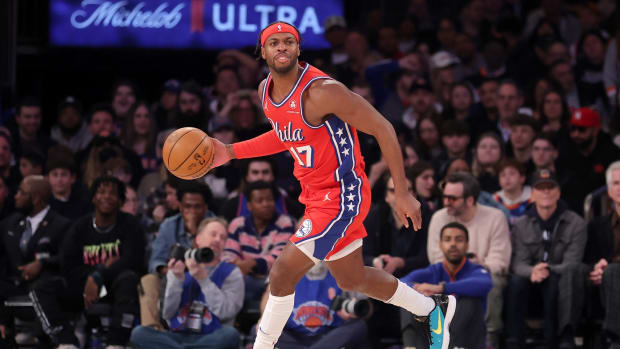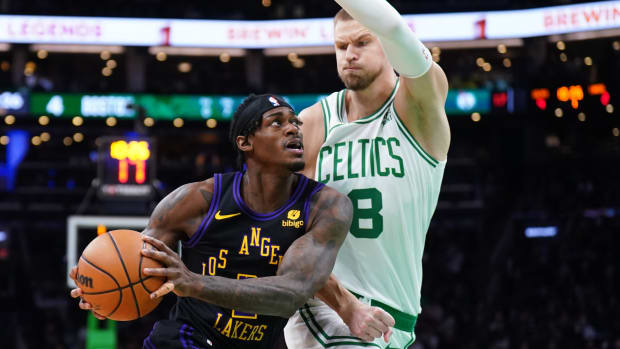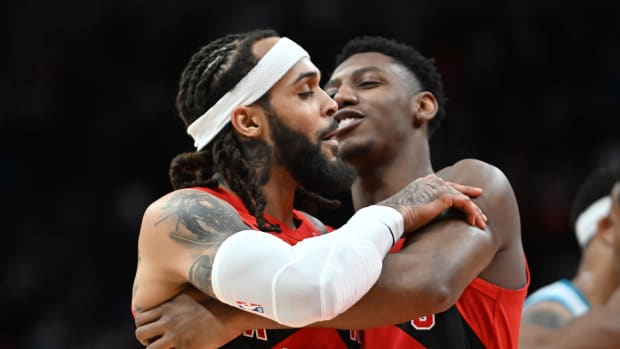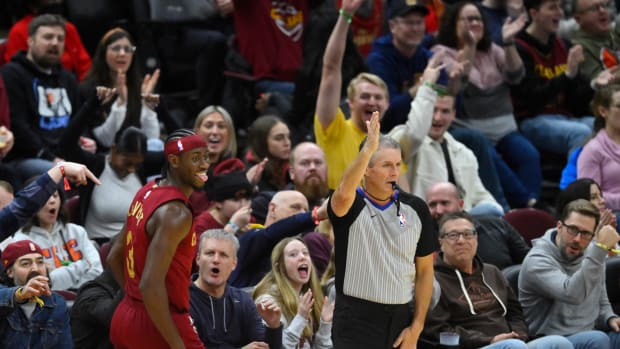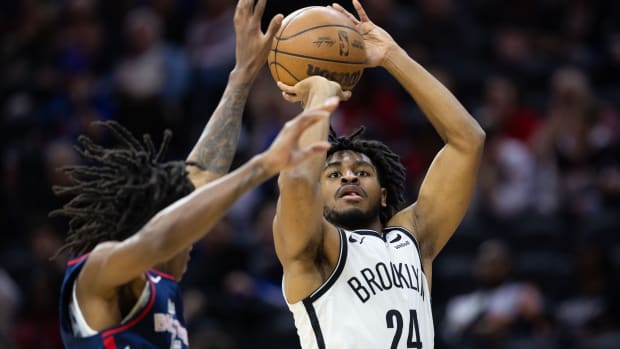Carmelo Anthony's Arrival Further Bolsters a Dangerous Thunder Lineup
Trading for a fading star like Carmelo Anthony is the type of move that aspiring contenders usually agonize over, diligently weighing his scoring ability and box-office appeal against the baggage that vexed, and ultimately sank, Phil Jackson.
The 33-year-old forward is an unapologetic ball-stopper and lackluster defender who, despite being four seasons past his prime, is set to make $26.2 million this season. He’s had the green light to shoot since he was a teenaged rookie, and has had numerous well-documented struggles sharing the spotlight with talented teammates and seeing eye-to-eye with coaches. He’s missed an average of 15 games over the last six seasons, he’s won one playoff series since 2010, and he’s been on four straight lottery teams.
For years now, critics have derided Anthony as an overpaid, me-first loser, and his best defense has been that no man can be expected to overcome the Knicks’ institutional dysfunction. Give him a change of scenery and a magical hooded sweatshirt, Anthony’s loyalists retort, and watch him prosper like it’s the 2012 Olympics all over again.
Knicks Trade Carmelo Anthony to Thunder
It’s easy to see why Anthony wouldn’t be worth the hassle for a vast majority of the NBA’s teams, including the post-Jackson Knicks. He can’t single-handedly carry a bad team to respectability any more. His presence complicates, and probably delays, any rebuilding effort or youth movement. He makes too much money to easily slide onto a top-shelf contender. And he no longer delivers the necessary impact to be worth a core piece or a valuable draft pick in trade.
And yet the Thunder somehow traded for Anthony in a move that required little second-guessing, soul-searching or nail-biting. Oklahoma City reportedly acquired the 10-time All-Star on Sunday in exchange for Enes Kanter, Doug McDermott and a second-round pick. In theory, adding Anthony to a star-studded roster should inspire a deep breath and careful consideration. Here, Thunder GM Sam Presti had no reason to blink.
It helps that Oklahoma City gave up next to nothing. Kanter is pure fool’s gold, a scoring center whose abysmal defense made him increasingly unplayable in the playoffs and whose contract is one of the league’s worst. McDermott has one NBA skill—shooting—but is similarly a walking mismatch against the West’s elite teams come playoff time. “You cringed when any of their bench guys got on the court,” one rival scout told SI.com last week. “Their depth was so bad that, even after stealing Paul George, they only had one good lineup.”
Anthony’s arrival further bolsters a potentially potent Thunder starting lineup featuring Russell Westbrook, Andre Roberson, George, Anthony and Steven Adams. That group now boasts three star-quality scorers, improved spacing around Westbrook, and enough defensive length and versatility to cover for Anthony.
More importantly, though, Anthony gives Oklahoma City a chance to have a workable alternate postseason look, a smaller lineup that utilizes newly-acquired power forward Patrick Patterson in place of Adams. Before the trade, Oklahoma City’s small ball looks were uninspiring because McDermott, Alex Abrines and Jerami Grant were all flawed and unproven options. Against Golden State and Houston, Oklahoma City was bound to be checkmated quickly because of those truly weak links.
Trade Grades: Carmelo Anthony Deal Yet Another Steal for Thunder
Now, when a playoff series inevitably downsizes, the Thunder can field Patterson flanked by the three stars and Roberson. Or, they can try to go fun-and-gun by pairing two point guards – Westbrook and Raymond Felton—with George, Anthony and Patterson for maximum spacing and offensive upside. Those groups aren’t perfect and they almost certainly won’t be enough to withstand the Warriors’ onslaught in part because of Anthony’s defensive limitations, but overall they’re vast improvements. The “Westbrook doesn’t have any help” line of thinking should no longer apply, immediately giving way to “Westbrook needs to find a way to make this work.”
Indeed, Westbrook is at the center of every Oklahoma City move, including this one. The reigning MVP has yet to sign a max extension, and the Anthony trade represents a natural extension of Presti’s previous deal for George. By aggressively turning role players into high-wattage stars and, in this move, adding roughly $5 million in payroll and incurring subsequent luxury tax penalties, Presti is signaling to Westbrook his commitment to winning and his ability to keep up in the ongoing arm’s race for star talent. If Westbrook somehow follows Kevin Durant out of Oklahoma City, overly-deliberate management or penny-pinching ownership can’t be cited as driving forces this time around.
Melo-Drama: A Brief Timeline of Carmelo Anthony’s Final Year as a Knick
Anthony isn’t the player he was a few years ago, he isn’t Warriors kryptonite, and he isn’t necessarily committed to Oklahoma City past this season. If Presti’s pro-active experiment sputters, if the offense doesn’t gel because there’s only one ball for three scorers, or if George bails for LA, Anthony could always opt out come July and survey his options. Until then, he gets a chance to play meaningful basketball for the first time in years alongside two in-their-prime stars who are superior to any of his Knicks teammates over the past seven-plus seasons and who want more from life than an early playoff exit.
When Anthony arrived in New York, his trade from Denver made for years of great debates. Should the Knicks have sacrificed so many core pieces to get him? Should they have waited to sign him in free agency? Who was making the call: ownership or the front office? Was he good enough to be the best player on a title team? As he lands in Oklahoma City, Anthony’s latest trade should elicit much simpler and less dramatic questions. Is he worth a financial investment and two forgettable players to a team lacking in depth and long-term relationships with its stars? Yes. Is he worth a shot for a team with no championship delusions and an especially strong desire to advance to the second round? Absolutely.































